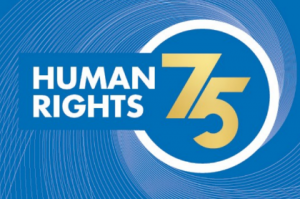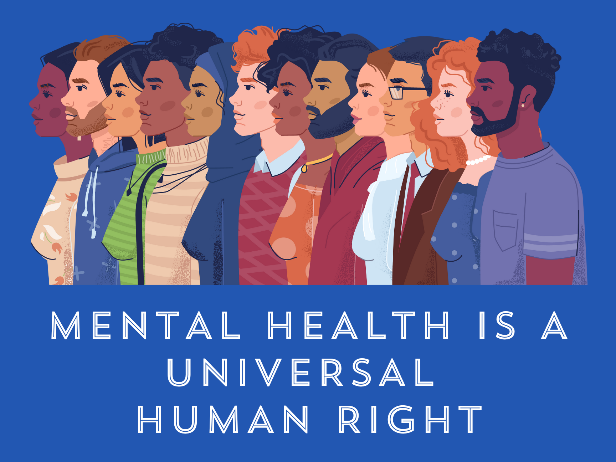
Updates from the Front Lines:...
To commemorate National Human Trafficking Prevention Month, USCRI, along with the University of South Carolina, Georgetown University’s Institute for the...
READ FULL STORY
 December 10th marks the 75th anniversary of the Universal Declaration of Human Rights (UDHR), a landmark document that enshrines the inalienable rights of all human beings regardless of race, religion, sex, political or other opinions, national or social origin, property, birth, or other status. This year’s theme for International Human Rights Day is Freedom, Equality, and Justice for All. Unfortunately, the promise of the UDHR for forcibly displaced migrants and refugees and their right to health has been neglected and under sustained assault in recent years, often leaving their human rights as a privilege granted exclusively at the discretion of host countries.
December 10th marks the 75th anniversary of the Universal Declaration of Human Rights (UDHR), a landmark document that enshrines the inalienable rights of all human beings regardless of race, religion, sex, political or other opinions, national or social origin, property, birth, or other status. This year’s theme for International Human Rights Day is Freedom, Equality, and Justice for All. Unfortunately, the promise of the UDHR for forcibly displaced migrants and refugees and their right to health has been neglected and under sustained assault in recent years, often leaving their human rights as a privilege granted exclusively at the discretion of host countries.
The right to health is a fundamental human right which covers physical, mental, and social well-being and is essential to the realization of other human rights. While mental health is an integral and essential component of the right to health, the former is too often neglected. Mental, neurological, and substance-use disorders represent around 14% of all health needs globally, with mental illness affecting nearly one in three individuals during their lifetime (Porsdam Mann et al., 2016). The 2019 annual economic cost of mental illness globally was estimated at around $5 trillion with a projected increase to $16 trillion by 2030, however mental health continues to be a low priority for many governments, donors, and policymakers (Carter Center, 2018; Porsdam Mann et al., 2016).
The World Health Organization (WHO) defines mental health as a “state of mental well-being that enables people to cope with the stresses of life, realize their abilities, learn well, and work well, and contribute to their community…. Mental health is a basic human right. And it is crucial to personal, community and socio-economic development” (WHO, 2014). This definition implies that mental health is determined by the interaction of the individual with society and is shaped by the conditions in which people are born, grow, work, and live, and cannot be viewed in isolation from their human rights (WHO & UN, 2023). The wide range of factors that influence mental health, known as social determinants of health (SDH), are shaped by the distribution of money, power, and resources at the global, national, and local levels. Examples of SDH include age, sex, sexual orientation, gender identity or expression, disability, racial and ethnic origin, socioeconomic status, migration or refugee status, and exposure to violence, poverty, and discrimination. Therefore, the risks for developing mental disorders or poorer mental health are significantly greater for members of groups with less access to power and material resources.
As one of the most vulnerable groups, forcibly displaced populations are at a high risk for developing mental health issues, and refugees are the most vulnerable to mental health problems of all migrant groups (Hynie, 2018). The prevalence of common mental disorders such as posttraumatic stress disorder (PTSD), depression, and anxiety tends to be higher among migrants and refugees than among host country populations. Although research has found that pre-migration and migration-related losses and trauma significantly contribute to refugees’ psychological distress, post-migration problems are more powerful determinants of poorer mental health among refugees (Kronick et al., 2021). Post-migration SDH that have been found to consistently compound the effects of past traumas and contribute to poorer mental health outcomes among refugees include, unemployment and financial strain, inadequate or overcrowded housing, lack of language proficiency, prolonged detention, insecure immigration status or visa uncertainty, social isolation and family separation, and discrimination.
 In addressing and improving global mental health for everyone, particularly for refugees and other minority groups, mental health models must address the underlying environmental conditions that contribute to poorer mental, including post-migration problems in host countries of resettlement. Mental health policies and programs should seek to raise awareness and challenge stigma and promote person-centered and community-based services that are culturally appropriate and safe and increase access to quality care.
In addressing and improving global mental health for everyone, particularly for refugees and other minority groups, mental health models must address the underlying environmental conditions that contribute to poorer mental, including post-migration problems in host countries of resettlement. Mental health policies and programs should seek to raise awareness and challenge stigma and promote person-centered and community-based services that are culturally appropriate and safe and increase access to quality care.
The international human rights framework requires that countries adopt and invest in a human rights-based approach to mental health legislation whereby mental health is viewed as a fundamental human rights concern (WHO & UN, 2023). A human rights-based approach shifts the focus to the interactions between the individual and the environment within the wider context of human diversity. Legislation and policies based on human rights can provide mental health information, programs, practices, and services that are tailored to the cultural and religious needs of diverse communities. A human rights-based approach to mental health tackles stigma and discrimination by promoting diversity, inclusion, and equal access to quality, culturally responsive, holistic, and person-centered mental health services. Since mental health is influenced by multiple social, political, economic, and environmental factors, a human rights-based approach requires the harmonized engagement of stakeholders across sectors and an integrated, multilayered approach to mental health treatment and prevention.
On the 75th anniversary of the Universal Declaration of Human Rights and at a time of unprecedented levels of displacement globally, we are faced with the ever more urgent moral and legal imperative to help alleviate the enormous mental health burden among displaced people by providing them with mental health care that respects, protects, and fulfills their human rights. On this Human Rights Day, let us commit to advancing mental health as a vital universal human right and to protecting the rights of refugees and asylum seekers everywhere.
References
Carter Center. (2018). Mental illness will cost the world $16 USD trillion by 2030. Psychiatric Times, 35(11), 1-36. https://cdn.sanity.io/files/0vv8moc6/psychtimes/d01c0e5dc1da8524742966a621402c91c27f521e.pdf/psy1118_ezine.pdf
Hynie, M. (2018). The social determinants of refugee mental health in the post-migration context: A critical review. Canadian journal of psychiatry, 63(5), 297–303.
Kronick, R., Jarvis, G. E., & Kirmayer, L. J. (2021). Refugee mental health and human rights: A challenge for global mental health. Transcultural Psychiatry, 58(2), 147-156.
Porsdam Mann, S., Bradley, V. J., & Sahakian, B. J. (2016). Human rights-based approach to mental health: A review of programs. Health and Human Rights Journal, 18(1). Retrieved from https://www.hhrjournal.org/2016/05/human-rights-based-approaches-to-mental-health-a-review-of-programs/
WHO. (2022). Mental health. Retrieved from https://www.who.int/news-room/fact-sheets/detail/mental-health-strengthening-our-response
WHO & UN. (2023). Mental health, human rights and legislation: Guidance and practice. Retrieved from https://www.ohchr.org/en/publications/policy-and-methodological-publications/mental-health-human-rights-and-legislation

To commemorate National Human Trafficking Prevention Month, USCRI, along with the University of South Carolina, Georgetown University’s Institute for the...
READ FULL STORY
For more than a century, the U.S. Committee for Refugees and Immigrants has advocated for the rights and dignity of refugees,...
READ FULL STORY
By Veronica Farkas, TVAP/Aspire Case Manager My job as a Case Manager is a combination of advocacy, crisis response, and long-term...
READ FULL STORY